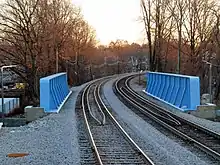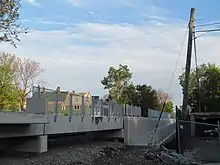Talbot Avenue | |||||||||||||||
|---|---|---|---|---|---|---|---|---|---|---|---|---|---|---|---|
 An inbound train at Talbot Avenue station in July 2019 | |||||||||||||||
| General information | |||||||||||||||
| Location | 210 Talbot Avenue Dorchester, Boston, Massachusetts | ||||||||||||||
| Coordinates | 42°17′36″N 71°04′42″W / 42.2932°N 71.0784°W | ||||||||||||||
| Line(s) | Dorchester Branch | ||||||||||||||
| Platforms | 2 side platforms | ||||||||||||||
| Tracks | 2 | ||||||||||||||
| Connections | |||||||||||||||
| Construction | |||||||||||||||
| Accessible | Yes | ||||||||||||||
| Other information | |||||||||||||||
| Fare zone | 1A | ||||||||||||||
| History | |||||||||||||||
| Opened | November 12, 2012[1] | ||||||||||||||
| Passengers | |||||||||||||||
| 2018 | 213 (weekday average boardings)[2] | ||||||||||||||
| Services | |||||||||||||||
| |||||||||||||||
| Location | |||||||||||||||
Talbot Avenue station is an MBTA Commuter Rail station in Boston, Massachusetts. It serves the Fairmount Line. It is located near Codman Square in the Dorchester neighborhood. The station includes two full-length high-level platforms located north of Talbot Avenue, which are also accessible from Park Street and West Park Street. The station opened on November 12, 2012 as the first of four new stations on the Fairmount Line.[1] Talbot Avenue was the first completely new rail station to open in the City of Boston since Yawkey opened in 1988.[3]
History
Previous service

Service on the Fairmount Line (as the Dorchester Branch of the Norfolk County Railroad and later the New York and New England Railroad and New York, New Haven and Hartford Railroad) began in 1855 and lasted until 1944. Stations were located at Harvard Street (Carlton) and Dorcester (at Woodrow Avenue), which are one quarter-mile to the north and south of the new station site.
The grade crossing at Harvard Street was replaced by a road bridge by the late 19th century, while Park Street was severed at the tracks.[lower-alpha 1] Talbot Avenue was extended from Codman Square to Blue Hill Avenue in 1897, with an underpass of the railroad tracks.[10] Lauriat Avenue (now Woodrow Avenue) was lowered under the tracks adjacent to Dorchester station around 1899.[11]
A new Harvard Street station – a converted house on the east side of the tracks – was placed into service on January 1, 1903.[12] The old station building across the tracks remained in use for some time afterwards; a footbridge was constructed over the tracks by 1904.[12][9][13] By 1906, Dorchester station was the outer terminus for some short turn trains on the line.[14]
Restoration and plans

Temporary shuttle service resumed on the Fairmount Line in 1979 during Southwest Corridor construction, with stops at Uphams Corner, Morton Street, and Fairmount. The MBTA planned to drop the shuttle after service resumed on the Southwest Corridor in 1987, but the service was locally popular and the Fairmount Line became a permanent part of the system.
A plan called the Indigo Line was later advanced by community activists in which the line would add stations and more frequent service to closely resemble a conventional rapid transit line. The Indigo Line plan was not adopted, but elements of it were included when the Commonwealth of Massachusetts agreed in 2005 to make improvements on the Fairmount Line part of its legally binding commitment to mitigate increased air pollution from the Big Dig. Among the selected improvements in the Fairmount Line Improvements project were four new commuter rail stations on the line, including one at Talbot Avenue as well as Newmarket, Four Corners/Geneva, and Blue Hill Avenue. The stations were originally to be completed by the end of 2011.[15]
Talbot Avenue station

A $15.9 million contract for construction of the station and the replacement of the adjacent Talbot Avenue overpass was awarded in August 2010.[16] Construction began in November 2010, with a footbridge connecting Park Street to West Park Street removed in December.[17] An official groundbreaking was held in June 2011.[18] The bridge over Talbot Avenue was replaced during the third weekend of December 2011, using techniques developed in MassDOT's Fast 14 highway bridge replacement program.[15]
The station was 80% complete by April 2012.[15] By September, the station was 92% finished, with only minor cosmetic work remaining.[19] On September 13, the MBTA announced that the station was planned to open in October 2012.[20] The station did not open in October; on November 7, the MBTA announced the opening date. The station opened on schedule on November 12, 2012.[1] In April 2013, a 6-foot fence on both platforms was erected in response to privacy concerns from residents of abutting properties.[21][22] Ribbon-cutting ceremonies were held at Newmarket, Four Corners/Geneva, and Talbot Avenue on July 17, 2013.[23]
References
- 1 2 3 Rocheleau, Matt (November 12, 2012). "MBTA opens new commuter rail station at Talbot Avenue in Dorchester on Fairmount Line". Boston Globe. Retrieved November 12, 2012.
- ↑ Central Transportation Planning Staff (2019). "2018 Commuter Rail Counts". Massachusetts Bay Transportation Authority.
- ↑ Belcher, Jonathan. "Changes to Transit Service in the MBTA district" (PDF). Boston Street Railway Association.
- ↑ Davis, Thomas W. (1880). "Plan of Dorchester". City of Boston.
- 1 2 "Plate 23". Atlas of the city of Boston : Dorchester, Mass., vol. 5 : from actual surveys and official plans. G.W. Bromley & Co. 1894.
- 1 2 "Plate 5". Atlas of Dorchester, West Roxbury and Brighton, city of Boston. J.P. Brown & Co. 1899.
- 1 2 "Plate G". Atlas of the city of Boston : Dorchester : volume three : from actual surveys and official records. G.W. Bromley & Co. 1884.
- 1 2 "Plate 23". Atlas of the city of Boston, volume five, Dorchester Mass. : from actual surveys and official plans. G.W. Bromley & Co. 1889.
- 1 2 "Plate 23". Atlas of the city of Boston : Dorchester, Mass., vol. 5 : from actual surveys and official plans (4 ed.). G.W. Bromley & Co. 1904.
- ↑ "Real Estate Matters". Boston Globe. November 10, 1897. p. 9 – via Newspapers.com.
- ↑ "Lauriat Av Hearing". Boston Globe. April 20, 1899. p. 8 – via Newspapers.com.
- 1 2 "New Station Building Open". Boston Globe. January 1, 1903. p. 5 – via Newspapers.com.
- ↑ "Plate 23". Atlas of the city of Boston : Dorchester : from actual surveys and official plans. G.W. Bromley & Co. 1933.
- ↑ "Boy Struck By Train". Boston Globe. August 30, 1906. p. 2 – via Newspapers.com.
- 1 2 3 "State Implementation Plan – Transit Commitments Monthly Status Report" (PDF). Massachusetts Department of Transportation. April 19, 2012. Archived (PDF) from the original on August 1, 2017.
- ↑ Grillo, Thomas (August 17, 2010). "T seeks builder for Roxbury commuter station". Boston Herald – via MBTA.
- ↑ Dumcius, Gintautas (December 2, 2010). "Construction gets under way at Talbot Ave. commuter rail stop". Dorchester Reporter. Retrieved May 9, 2012.
- ↑ "Governor Patrick Celebrates Groundbreaking for Talbot Avenue Commuter Rail Station". Commonwealth of Massachusetts. June 7, 2011. Retrieved May 9, 2012.
- ↑ "State Implementation Plan – Transit Commitments Monthly Status Report" (PDF). Massachusetts Department of Transportation. September 20, 2012. Retrieved October 4, 2012.
- ↑ Rosso, Patrick (September 13, 2012). "Fairmount Indigo Planning Initiative looks for economic jolt along rail line". Boston Globe. Retrieved September 14, 2012.
- ↑ "State Implementation Plan – Transit Commitments Monthly Status Report" (PDF). Massachusetts Department of Transportation. April 18, 2013. Retrieved May 17, 2013.
- ↑ Irons, Meghan E. (May 17, 2013). "MBTA to open two new stations on Fairmount Line". Boston Globe. Retrieved May 17, 2013.
- ↑ "Patrick Administration Opens Three New Commuter Rail Stations". Massachusetts Bay Transportation Authority. July 17, 2013. Retrieved July 17, 2013.
- Notes